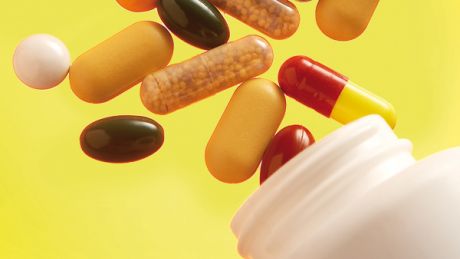Why do I need antioxidants?
Learn the real deal about antioxidants

What are they? Antioxidant supplements contain differing amounts of nutrients and plant extracts, including betacarotene, vitamins C and E, zinc, copper and magnesium. As well as having a beneficial effect on your general health, antioxidants can also help you recover from sports training.
What do they do? Very intense exercise, alongside smoking, sunburn, stress and pollution, can increase your body's generation of molecules known as free radicals, which can harm cell membranes, disrupt DNA and increase your risk of age-related diseases and cancer. There's some evidence that antioxidant supplements can protect against this, although some research suggests that supplements are less effective than getting antioxidants naturally as part of your diet. Evidence that they'll actually help your sports performance is harder to come by.
Who should take it? Though not everyone agrees with him, Gregg Marsh says, 'Due to our environment and stress levels, everyone should be on some type of antioxidant.' They work best if rotated, so for ten days you might use green tea, and for another ten days use grapeseed extract.'
How much should I take? 'The EU recommended daily amount for vitamin C is 60mg and for vitamin E 10mg,' says Anita Bean. 'But these are levels judged sufficient to support health, and a number of scientists believe they are too low.' Crucially, though, Bean says supplements are no substitute for proper nutrition: 'Aim to eat at least five portions of fruit and vegetables daily - the more intense the colour, the higher the antioxidant content.' Including as many different coloured fruits and vegetables as possible ensures you get the widest variety of antioxidants.
When should I take them? This depends on the supplement you're taking and the effect you're looking for. 'Vitamin C is the antioxidant best taken after a workout because it blocks cortisol, the stress hormone,' says Marsh. A 2008 study suggested that antioxidants are most beneficial when taken with meals - rats fed red wine alongside meat ended up with fewer free radicals in their digestive tracts than their non-drinking siblings - but the evidence isn't conclusive.
Do they have any side effects? There are side effects related to excessive consumption of certain vitamins found in antioxidant supplements - massive amounts of carotene can turn your skin temporarily orange, for example. Also, the antioxidant minerals zinc, magnesium and copper - can be toxic in large doses. If you stick to the recommended dosage, though, you'll be fine.
These experts clued us up about antioxidants:
Anita Bean
is the author of The Complete Guide To Sports Nutrition (£15.99, A&C Black Publishers). For more visit anitabean.co.uk.
Dr. Lonnie Lowery
is an exercise physiologist, nutrition expert and former competitive bodybuilder. He is also a licensed dietician specialising in sports nutrition.
Nikhil Rao
is a trainee doctor, avid weightlifter and regular contributor to the US bodybuilding site t-nation.com. He has been using creatine for six years.
Gregg Marsh
is a strength and conditioning coach, personal trainer and nutrition consultant. He has more than eight years of experience in nutrition.
Get the Coach Newsletter
Sign up for workout ideas, training advice, reviews of the latest gear and more.
Coach is a health and fitness title. This byline is used for posting sponsored content, book extracts and the like. It is also used as a placeholder for articles published a long time ago when the original author is unclear. You can find out more about this publication and find the contact details of the editorial team on the About Us page.

